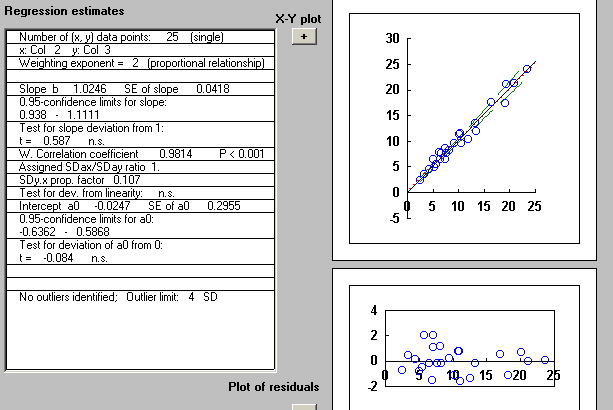CBstat: Method Evaluation and Comparison
Method evaluation:
Detection limit (incl. CLSI EP17), precision (within- and between-run acc. to NCCLS EP5),
precision profile, accuracy profile and evaluation of linearity on the basis of polynomial regression
acc. to the CLSI EP6-A Guideline (2003).
Method comparison:
The program performs the following types of regression analysis:
Ordinary least-squares regression analysis
Weighted least-squares regression analysis
Deming regression analysis
Weighted Deming regression analysis
Passing-Bablok regression
and
Difference plots
Polynomial regression analysis is also provided.
A Control chart is also included.
![]()
The program accepts single (x, y) or duplicate sets of measurements (x1, x2, y1, y2) which are entered or pasted into the spreadsheet or imported as a file (text or Excel file types).
Weighted Deming regression analysis is appropriate for comparison of two methods with proportional analytical errors, i.e. the probably most frequently occurring situation in clinical chemistry.
Intercept and slope are estimated with standard errors, and the 95%-confidence region is displayed. An example of the Results Page produced by the program is shown below. The case corresponds to weighted Deming regression analysis of the demo data example enclosed in the program.
W. Deming Regression Results XY Plot

The statistical procedures are described in:
Linnet K. Necessary sample size for method comparison studies based on regression analysis. Clin Chem 1999; 45: 882-94.
Linnet K. Performance of Deming regression analysis in case of misspecified analytical error ratio in method comparison studies. Clin Chem 1998; 44: 1024-1031.
Linnet K. Evaluation of regression procedures for methods comparison studies. Clin Chem 1993; 39. 424-432.
Linnet K. Estimation of the linear relationship between measurements of two methods with proportional errors. Stat Med 1990; 9: 1463-1473.